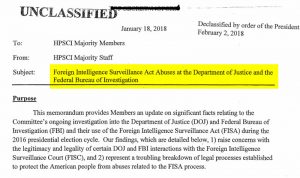He did the same thing former CIA Directors Petraeus and Deutch did, and Bill Clinton’s National Security Advisor did, and of course, what HRC did. But this guy is just a low level shmuck.
Former CIA Contractor Pleads Guilty to Illegally Retaining Classified Materials (DOJ)
Reynaldo B. Regis, 53, of Fort Washington, Maryland, and a former CIA contractor, pleaded guilty today to unauthorized removal and retention of classified materials, and making material false statements to federal law enforcement officers.
Assistant Attorney General for National Security John C. Demers, Acting U.S. Attorney Tracy Doherty-McCormick for the Eastern District of Virginia and Assistant Director in Charge Nancy McNamara of the FBI’s Washington Field Office made the announcement after U.S. District Judge Liam O’Grady accepted the plea.
According to court documents, Regis is a former employee of a government contractor who was assigned to the CIA between August 2006 and November 2016.
During his time at the CIA, Regis conducted unauthorized searches in classified databases and copied classified information into personal notebooks, which he removed from his workspace at the CIA and stored in his home without authorization.
When initially interviewed by federal law enforcement, Regis lied about having done so.
During a search of his home, FBI agents recovered approximately 60 notebooks containing classified information. The classified information contained in the notebooks included information relating to highly sensitive intelligence reports, disclosure of which could cause serious damage to the national security.
Regis faces a maximum sentence of five years in prison. Regis is scheduled to be sentenced on Sept. 21. The maximum statutory sentence is prescribed by Congress and is provided here for informational purposes. The sentencing of the defendant will be determined by the court based on the advisory Sentencing Guidelines and other statutory factors.
Trial Attorney Scott A. Claffee of the National Security Division’s Counterintelligence and Export Control Section and Assistant U.S. Attorney Danya E. Atiyeh of the Eastern District of Virginia are prosecuting this case.
Additional
Hillary Clinton
Hillary Clinton fails the ABCs of handling classified information (ABC News Opinion, Sept 2016)
When FBI agents showed Clinton an email from her private server with the classification marking (C) for “confidential” on it, the notes from her FBI interview said, “Clinton stated she did not know what the ‘(C)’ meant at the beginning of the paragraphs and speculated it was referencing paragraphs marked in alphabetical order.” CNN reports, “The former secretary of state said she did understand when an email was marked ‘confidential’ at the top, and ‘asked the interviewing agents if that was what ‘c’ referenced.’ ”
Good. God.
Did the FBI even bother to ask her, “Madam Secretary, if you thought it was alphabetical, then where are (A) and (B)?”
The fact is, every single person in America with even the lowest level of security clearance knows what (C) means. Clinton served on the Senate Armed Services Committee, where she regularly received classified information with a (C) marking on it. As secretary of state, she likely read classified documents with (C) markings every single day. And we’re supposed to believe she thought it was an alphabetical marking?
This was a fantastical argument for anyone with a security clearance, but it was totally lacking in credibility for someone with her proven pattern of deceit. Clinton has repeatedly changed her story: First, she told us there was “no classified material” in her private emails (which the FBI says was untrue). Then she told us there was nothing “classified at the time” (which the FBI also says was also untrue). Finally, she told us there was nothing “marked classified” in her private emails (which the FBI says was also untrue). So now she tells FBI interviewers that she does not know what (C) means, and they believe her?
The existence of any emails with classification markings destroys Clinton’s claim — which the FBI also bought — that there was no intent on the part of Clinton and her staff to send classified email on her unclassified system. The reason is simple: There is no way to “accidentally” send a document marked classified by unclassified email. Top officials have separate computers for classified and unclassified information, and the two systems are not connected. The only way for something marked classified to make it onto an unclassified system is for someone to intentionally put it there — either by typing the classified information into an unclassified email, or by downloading the information from a classified computer onto a thumb drive and then putting that thumb drive into an unclassified computer. Both actions require intent — and both are against the law. . . . (read more)
We interrupt this blog post for a DICE PUBLIC SERVICE ANNOUNCEMENT:
Ray Semko, The D*I*C*E Man, has been giving security awareness briefings since 1989 and volunteers to give a powerful D*I*C*E briefing to Hillary Clinton so that she is made well aware that the marking (C) on government documents means CONFIDENTIAL as in CLASSIFIED, SECRETS, NO FAIR TELLING.
Anyone who has ever been given access to classified information has had to sign a DOCUMENT stating they understand the classification markings.
If you have any employee in your organization who doesn’t understand them, make sure they are D*I*C*E’d by Ray Semko.
Clinton told FBI she had no training on how to handle classified documents (USA Today, Sept 2016)
During her consequential July interview with the FBI, Hillary Clinton displayed a slim grasp of the fine points for handling classified information and often expressed little recall for specific emails containing sensitive information that transited through a private server during her tenure as secretary of State.
Clinton, who could not remember receiving “any briefing or training” for handling such information, later acknowledged to agents that she did not recognize a common document marking used to identify it as classified information. . . . . (read more)
Clinton emailed classified information after leaving State Dept. (New York Post, Aug 2016)
Hillary Clinton continued sending classified information even after leaving the State Department, The Post has exclusively learned.
On May 28, 2013, months after stepping down as secretary of state, Clinton sent an email to a group of diplomats and top aides about the “123 Deal” with the United Arab Emirates.
But the email, which was obtained by the Republican National Committee through a Freedom of Information Act request, was heavily redacted upon its release by the State Department because it contains classified information.
The markings on the email state it will be declassified on May 28, 2033, and that information in the note is being redacted because it contains “information regarding foreign governors” and because it contains “Foreign relations or foreign activities of the United States, including confidential sources.”
The email from Clinton was sent from the email account — [email protected] — associated with her private email server.
The email’s recipients were Deputy Secretary of State William Burns, diplomat Jeffrey Feltman, policy aide Jake Sullivan, diplomat Kurt Campbell, State Department chief of staff Cheryl Mills, and Clinton aide Huma Abedin. . . . Clinton is believed to have sent 2,101 emails that contained at least some classified information. . . . (read more)
Justice Department ‘Looking Into’ Hillary Clinton’s Emails— Again (Daily Beast, Jan 2018)
Justice Department officials are taking a fresh look at Hillary Clinton’s use of a private email server while she served as secretary of State, The Daily Beast has learned.
An ally of Attorney General Jeff Sessions who is familiar with the thinking at the Justice Department’s Washington headquarters described it as an effort to gather new details on how Clinton and her aides handled classified material. Officials’ questions include how much classified information was sent over Clinton’s server; who put that information into an unclassified environment, and how; and which investigators knew about these matters and when. . . . (read more)
David Petraeus, CIA Director
Petraeus pleads guilty to mishandling classified material, will face probation (Washington Post, April 2015)
David H. Petraeus, a retired general considered one of the greatest military minds of his generation, pleaded guilty Thursday to a misdemeanor charge of mishandling classified materials, ending a long-running legal saga that had threatened to send him to prison.
Petraeus, who admitted he provided the materials to his former mistress and biographer, will instead face a two-year probationary period. U.S. Magistrate Judge David Keesler also imposed a $100,000 fine — more than double the amount recommended by prosecutors — to reflect the “seriousness of the offense.”
Before the sentencing, Keesler asked Petraeus whether he wanted to address the court. The former CIA director apologized to “those closest to me and others, including this court, for the pain my actions have caused.”
The plea follows a high-profile investigation and prosecution that triggered Petraeus’s resignation from the CIA in 2012. As part of an agreement with prosecutors, he admitted that he improperly removed and retained highly sensitive information in eight personal notebooks that he gave the biographer, Paula Broadwell, to read.
The deal angered FBI agents who worked on the lengthy investigation and who thought Petraeus should have been treated more harshly because of the information in the notebooks and what they considered his lack of candor.
When FBI agents confronted him in his CIA office in October 2012, Petraeus said he had never provided classified information to Broadwell, prosecutors said.
Making a false statement to a federal law enforcement agent during an investigation is a felony, a crime punishable by up to five years in prison. On Thursday, Keesler told Petraeus that he had been “untruthful” and that his behavior “constituted a serious lapse of judgment.”
It’s unclear whether the guilty plea will affect the former CIA director’s security clearances or his access to the White House, where he has counseled senior administration officials on how to combat the Islamic State. . . . (read more)
Sandy Berger, National Security Advisor
Ex-Clinton Aide to Admit Taking Classified Papers (New York Times, March 2005)
Samuel R. Berger, a national security adviser to President Bill Clinton, has agreed to plead guilty to a misdemeanor charge and give up his security clearance for three years for removing classified material from a government archive, the Justice Department and associates of Mr. Berger’s said Thursday.
A respected figure in foreign policy circles for years, Mr. Berger has also agreed to pay a $10,000 fine as part of an agreement reached recently with the Justice Department after months of quiet negotiations, the associates said.
He is expected to enter his plea on Friday in United States District Court here, capping an embarrassing episode that reverberated in last year’s presidential campaign.
Mr. Berger was a senior policy adviser to Senator John Kerry of Massachusetts, the Democratic presidential nominee, and was often mentioned as a possible secretary of state in a Kerry presidency. But he quit the campaign abruptly in July after accusations surfaced that he had inappropriately removed classified material from a secure reading room at the National Archives.
The material involved a classified assessment of terrorist threats in 2000, which Mr. Berger was reviewing in his role as the Clinton administration’s point man in providing material to the independent commission investigating the attacks of Sept. 11, 2001. Officials with the Archives and the Sept. 11 commission ultimately determined that despite the incident, the commission had access to all the material needed in its work.
When the issue surfaced last year, Mr. Berger insisted that he had removed the classified material inadvertently. But in the plea agreement reached with prosecutors, he is expected to admit that he intentionally removed copies of five classified documents, destroyed three and misled staff members at the National Archives when confronted about it, according to an associate of Mr. Berger’s who is involved in his defense but who spoke on the condition of anonymity because the plea has not been formalized in court. . . . (read more)
Clinton’s National Security Advisor Hid Classified Papers Under Trailer (AP, Dec 2006)
President Clinton’s national security adviser removed classified documents from the National Archives, hid them under a construction trailer and later tried to find the trash collector to retrieve them, the agency’s internal watchdog said Wednesday.
The report was issued more than a year after Sandy Berger pleaded guilty and received a criminal sentence for removing the documents.
Berger took the documents in the fall of 2003 while working to prepare himself and Clinton administration witnesses for testimony to the Sept. 11 commission. Berger was authorized as the Clinton administration’s representative to make sure the commission got the correct classified materials.
Berger’s lawyer, Lanny Breuer, said in a statement that the contents of all the documents exist today and were made available to the commission.
Berger pleaded guilty to unlawfully removing and retaining classified documents. He was fined $50,000, ordered to perform 100 hours of community service and was barred from access to classified material for three years.
Inspector General Paul Brachfeld reported that National Archives employees spotted Berger bending down and fiddling with something white around his ankles.
The employees did not feel at the time there was enough information to confront someone of Berger’s stature, the report said.
Later, when Berger was confronted by Archives officials about the missing documents, he lied by saying he did not take them, the report said.
Brachfeld’s report included an investigator’s notes, taken during an interview with Berger. The notes dramatically described Berger’s removal of documents during an Oct. 2, 2003, visit to the Archives.
Berger took a break to go outside without an escort while it was dark. He had taken four documents in his pockets.
“He headed toward a construction area. … Mr. Berger looked up and down the street, up into the windows of the Archives and the DOJ (Department of Justice), and did not see anyone,” said notes prepared by the inspector general’s office.
He then slid the documents under a construction trailer, according to the inspector general. Berger acknowledged that he later retrieved the documents from the construction area and returned with them to his office.
“He was aware of the risk he was taking,” the inspector general’s notes said. Berger then returned to the Archives building without fearing the documents would slip out of his pockets or that staff would notice that his pockets were bulging.
The notes said Berger had not been aware that Archives staff had been tracking the documents he was provided because of earlier suspicions from previous visits that he was removing materials. Also, the employees had made copies of some documents.
In October 2003, the report said, an Archives official called Berger to discuss missing documents from his visit two days earlier. The investigator’s notes said, “Mr. Berger panicked because he realized he was caught.”
The notes said that Berger had “destroyed, cut into small pieces, three of the four documents. These were put in the trash.”
After the trash had been picked up, Berger “tried to find the trash collector but had no luck,” the notes said. . . .
Sandy Berger’s Theft of Classified Documents: Unanswered Questions (US House of Representatives, Committee on Oversight and Government Reform (January 2007)
John Deutch, former CIA Director, Secretary of Defense
CIA suspends former director’s security clearance (CNN, August 1999)
The CIA has suspended the security clearance of former director John Deutch because he kept classified files on an unsecured home computer.
CIA director John Tenet revoked Deutch’s clearance after an internal agency investigation determined that Deutch kept classified materials on an unsecured government computer provided for his use at home. The sanctions mark the first time in recent history such an action has been taken against a former public official of Deutch’s stature. . . . (Read more)
Ex-CIA Director May Face Misdemeanor for Breach (LA Times, September 2000)
While former Los Alamos scientist Wen Ho Lee has pleaded guilty to a felony for unlawfully downloading national defense data, former CIA Director John M. Deutch is still under investigation by the Justice Department for a similar infraction.
There are indications, however, that Deutch–if he is accused at all–will face no more than a misdemeanor charge.
The Deutch case is notable because Atty. Gen. Janet Reno initially declined any prosecution last year for his conduct in storing thousands of pages of highly classified information on unsecured personal computers at his home.
Ten months later, under pressure from Congress and a highly critical CIA inspector general’s report, she ordered the FBI to launch a criminal investigation. Critics said that it seemed unfair to prosecute Lee and not the man who headed the CIA after serving as the Pentagon’s No. 2 official.
Deutch, who resigned from the intelligence agency in December 1996, was found to have kept large volumes of secret material on home computers used to connect to the Internet, suggesting the possibility that a hacker could have obtained the classified data. . . . (read more)
IMPROPER HANDLING OF CLASSIFIED INFORMATION BY JOHN M. DEUTCH (CIA IG Report)
John M. Deutch held the position of Director of Central Intelligence (DCI) from May 10, 1995 until December 14, 1996. Several days after Deutch’s official departure as DCI, classified material was discovered on Deutch’s government-owned computer, located at his Bethesda, Maryland residence.
The computer had been designated for unclassified use only and was connected to a modem. This computer had been used to access [an Internet Service Provider (ISP)], the Internet, [Deutch’s bank], and the Department of Defense (DoD). This report of investigation examines Deutch’s improper handling of classified information during his tenure as DCI and how CIA addressed this matter. . . .












